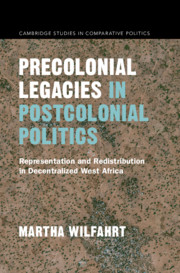 Precolonial Legacies in Postcolonial Politics
Precolonial Legacies in Postcolonial Politics This chapter presents the results of an original survey of more than 350 local elites sampled from across Senegal’s precolonial geography to develop insights into how local actors experience and evaluate their local governments. Throughout their answers to open-ended questions, respondents invoke the past when describing local sociopolitical cleavages. Cumulatively, their responses illustrate how cross-village social institutions motivate local political action under decentralization in historically centralized areas. Where cross-village social institutions are absent, local politics are more frequently described as contentious and conflictual. I use this survey data to elaborate the foundations of my theory and to deduce the theory’s two mechanisms: the role of group identities and social network ties. Both mechanisms are present and mutually reinforcing in areas that were home to precolonial kingdoms, while they are fragmented across space in historically acephalous zones. The findings show that otherwise similar local governments are home to distinct political climates as a function of their long-run political histories.
To save this book to your Kindle, first ensure no-reply@cambridge.org is added to your Approved Personal Document E-mail List under your Personal Document Settings on the Manage Your Content and Devices page of your Amazon account. Then enter the ‘name’ part of your Kindle email address below. Find out more about saving to your Kindle.
Note you can select to save to either the @free.kindle.com or @kindle.com variations. ‘@free.kindle.com’ emails are free but can only be saved to your device when it is connected to wi-fi. ‘@kindle.com’ emails can be delivered even when you are not connected to wi-fi, but note that service fees apply.
Find out more about the Kindle Personal Document Service.
To save content items to your account, please confirm that you agree to abide by our usage policies. If this is the first time you use this feature, you will be asked to authorise Cambridge Core to connect with your account. Find out more about saving content to Dropbox.
To save content items to your account, please confirm that you agree to abide by our usage policies. If this is the first time you use this feature, you will be asked to authorise Cambridge Core to connect with your account. Find out more about saving content to Google Drive.